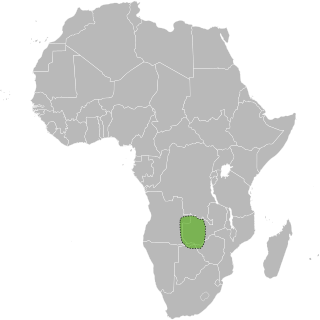
The Kololo or Makololo are a subgroup of the Sotho-Tswana people native to Southern Africa. In the early 19th century, they were displaced by the Zulu, migrating north to Barotseland, Zambia. They conquered the territory of the Luyana people and imposed their own language. The combination of Luyana and Kololo languages gave rise to the current Lozi language spoken by the Lozi people, descendants of the Luyana and nearby tribes. In 1864, the Kololo kingdom was overthrown and some chiefs moved to Chikwawa District, Malawi, with David Livingstone.
Sebetwane was chief of the Patsa branch of the Bafokeng clan. He established the large and powerful Makololo nation in what is now southwestern Zambia after an arduous migration of over 1200 kilometres from the clan's ancestral lands, near modern day Biddulphsberg, in the Free State province of South Africa.
Mamochisane was a Makololo Queen who ruled over many people, but especially the Lozi in Barotseland, today's Western Zambia, in 1851. She was later a wife of King Sipopa Lutangu.
Sekeletu was the Makololo King of Barotseland in western Zambia from about 1851 to his death in 1863.
The Litunga of Barotseland is the king of the Barotse people. The Litunga resides near the Zambezi River and the town of Mongu, at Lealui on the floodplain in the dry season, and on higher ground at Limulunga on the edge of the floodplain in the wet season. The Litunga moves between these locations in what is known as the Kuomboka ceremony.
Setlutlu was a Queen as a consort of King Sebetwane, chief of Makololo tribe. She is also known as Masekeletu.
Mbololo was a Litunga (chief) of Makololo tribe, a successor of Liswaniso. He ruled from 1863 to 1864. He was the last king of the Makololo dynasty.

Mulambwa Santulu was a litunga of Barotseland who ruled from 1812 to 1830.
Prince Mbanga was an African nobleman, the first Chief of Nalolo. His wife was named Notulu.
Notulu is a name shared by several noblewomen of Barotseland in Africa.
Mulena Yomuhulu Mbumu wa LitungaNgalama was a High Chief of Lozi people in Barotseland Zambia, Africa.
Mulena Yomuhulu Mbumu wa LitungaYeta I was a High Chief of the Lozi people in Barotseland, Africa.
Mulena Yomuhulu Mbumu wa LitungaInyambo was a Great African Chief of the Lozi people in Barotseland, Zambia, one of the first kings of the Lozi, and likely a mythical ruler or demigod.
Mulena Yomuhulu Mbumu wa LitungaMwanasolundwi Muyunda Mumbo wa Mulonga was a mythical ruler, High chief of the Lozi people in Zambia, Africa.
Mulena Yomuhulu Mbumu wa LitungaYeta II Nalute was an African High Chief, king of the Lozi people and Barotseland in Zambia.

Mulena Yomuhulu Mbumu wa LitungaSelumelume Muimui was a Chief of Barotseland in Africa.
Mulena Yomuhulu Mbumu wa LitungaMubukwanu was a High Chief of the Lozi people, King of Barotseland in Africa. He quarrelled with his brother Silumelume.

Mwanawina II was a King or Chief of the Lozi people in Zambia, Africa, a member of the third dynasty of Litungas. His full title was Mulena Yomuhulu Mbumu wa Litunga.
The Makololo chiefs recognised by the governments of colonial Nyasaland and independent Malawi have their origin in a group of porters that David Livingstone brought from Barotseland in the 1850s to support his first Zambezi expedition that did not return to Barotseland but assisted Livingstone and British missionaries in the area of southern Malawi between 1859 and 1864. After the withdrawal of the Universities' Mission to Central Africa those Makololo remaining in the Shire valley used firearms provided by the Europeans to attract dependants seeking protection, to seize land and to establish a number of chieftainships. At the time that a British protectorate was established in 1891, there were seven Makololo chiefs of which six were recognised by the government. Five survived to be given local governmental powers in 1933, and these powers continued after Malawi became independent. Although called Makololo or Kololo, after the ruling group in Barotseland in the 1850s, the majority came from peoples subject to the Makololo who adopted the more prestigious name. As, regardless of their origin, they took wives from among the inhabitants of the Shire Valley, their modern descendants have little connection with the Kololo people apart from their name.




